Foreign
Israeli Troops Pull Out Of Al Shifa Hospital, Gaza
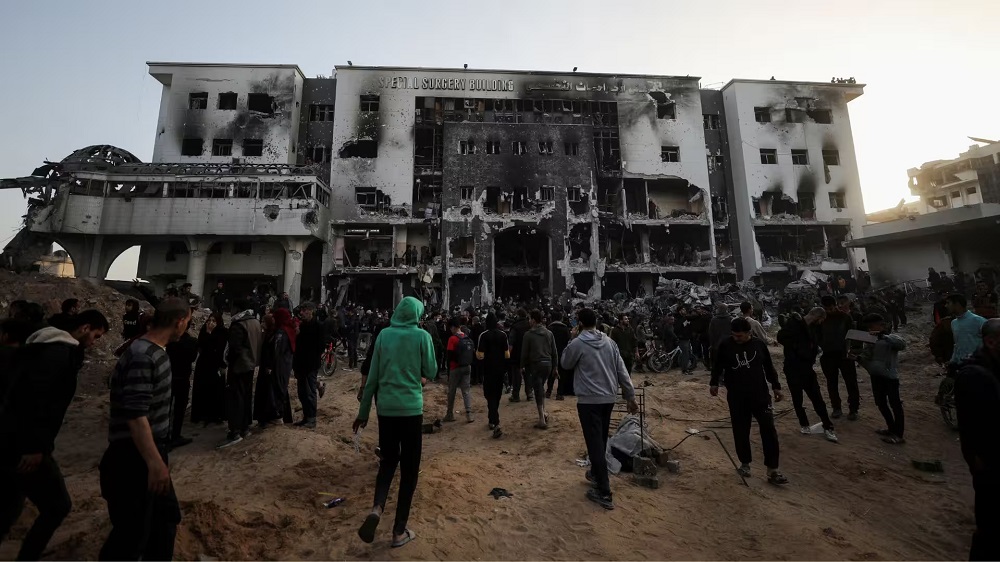
Israeli troops have pulled out of al-Shifa hospital in Gaza City, according to witnesses who spoke to the BBC.
The medical facility was first raided two weeks ago after the Israel Defense Forces (IDF) said it had intelligence indicating Hamas was using it as a base to launch attacks.
Heavy fighting has been reported around the hospital, the largest in Gaza, in recent weeks.
Hamas denies using medical sites to carry out military operations.
Following the withdrawal on Monday, Palestinian media reports said dozens of bodies were found in the vicinity of the complex, citing witnesses and the Hamas-run health ministry.
The BBC has not verified those reports. But the World Health Organization (WHO) has said 21 patients have died in al-Shifa in the past two weeks, while Israel’s Prime Minister Benjamin Netanyahu said more than 200 “terrorists” were killed.
When the raid was first announced, IDF chief spokesman Daniel Hagari said “Hamas terrorists have regrouped inside al-Shifa hospital”.
The IDF said then it was launching a “high-precision” operation on the grounds of the hospital and urged displaced civilians sheltering on its grounds to leave immediately.
Witnesses reported heavy gunfire and tanks surrounding the facility when the raid began in early hours of the morning on 18 March.
Al-Shifa was raided earlier in the conflict after Israel said it had evidence that hostages captured during the 7 October attack were taken there.
Israel has long accused Hamas of using civilian health infrastructure as a cover to launch its operations, which the Palestinian group refutes.
Dr Tedros Adhanom Ghebreyesus, head of the WHO, has described the situation at al-Shifa hospital as a “siege”.
In a post on X – formerly Twitter – made prior to the troops withdrawal, he said more than 100 people were still inside al-Shifa struggling with a lack of food water, and medical supplies.
But Mr Netanyahu has reiterated that al-Shifa was a “terrorist lair” and praised the efforts of Israeli soldiers for conducting a “precise and surgical” surprise attack.
The Israeli PM made his remarks on Sunday night prior to entering surgery to treat a hernia discovered during a routine check-up.
Early on Monday his office said the operation was successful and Mr Netanyahu was “in good shape and beginning to recover”.
The surgery took place amid demonstrations held in Jerusalem fuelled by mounting anger over his government’s handling of the war in Gaza. Thousands took to the streets demanding more action to free hostages.
Around 130 people – at least 34 of whom are presumed dead – are still unaccounted for after Hamas’s 7 October attack on Israel.
Mr Netanyahu is under pressure from some in Israeli society who believe there has been insufficient progress in rescuing the remaining hostages inside Gaza. His office had said Mr Netanyahu and his wife were meeting with the families of female soldiers still unaccounted for.
Also on Sunday, seven journalists – including a freelancer working for the BBC – were injured in an Israeli air strike on the grounds of al-Aqsa hospital targeting the Palestinian Islamic Jihad (PIJ) group.
The IDF hit a building in the grounds of the hospital which it said PIJ was using as a command centre.
Four members of the PIJ – which is allied with Hamas and participated in the 7 October attack – were killed, the IDF said.
Foreign
British actor Russell Brand charged with rape, sexual assault
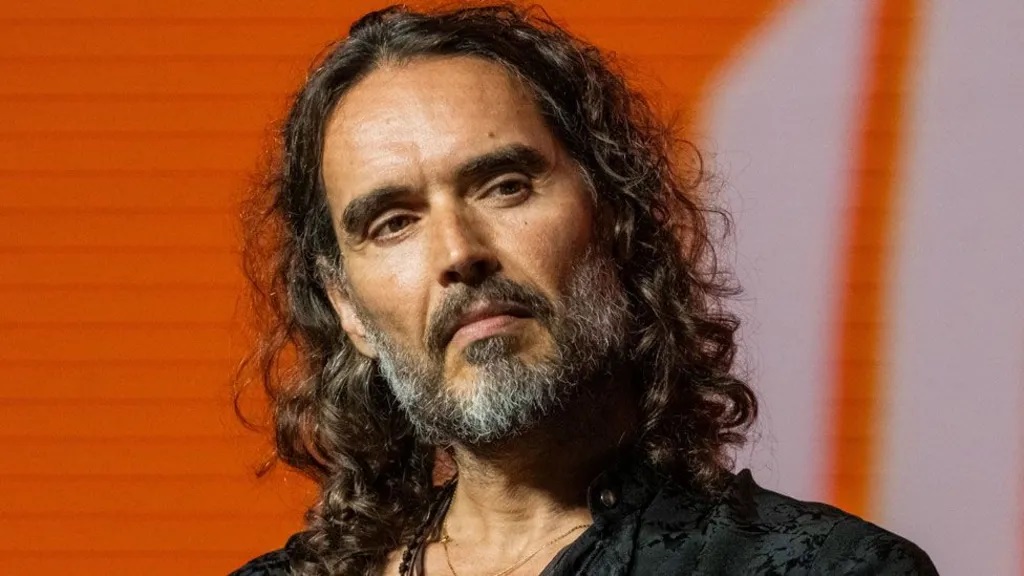
British actor Russell Brand has been charged with rape, indecent assault and sexual assault between 1999 and 2005.
The charges relate to four separate women.
Brand has been interviewed multiple times by police since an investigation by the Sunday Times, the Times and Channel 4’s Dispatches in September 2023 revealed multiple serious allegations against him.
In a new video posted on X this afternoon, Brand said: “What I never was, was a rapist. I’ve never engaged in non-consensual activity.”
He added: “I’m now going to have the opportunity to defend these charges in court and I’m incredibly grateful for that.”
In a short statement, the Metropolitan Police said it had written to Brand to inform him that he was being charged with one allegation of rape, one allegation of indecent assault, one of oral rape and two further counts of sexual assault.
The force said it is alleged that:
In 1999 a woman was raped in the Bournemouth area.
In 2001 a woman was indecently assaulted in the Westminster area of London.
In 2004 a woman was orally raped and sexually assaulted in the Westminster area of London.
Between 2004 and 2005, a woman was sexually assaulted in the Westminster area of London.
Brand has been told to appear at Westminster Magistrates’ Court on 2 May, but he is believed to be in the United States.
In these situations, where a suspect may be overseas, prosecutors seek to agree the defendant’s return. If there is no co-operation from a suspect, authorities then consider seeking extradition.
In February a civil case for “personal injury” and “sexual abuse” was lodged against Brand at the High Court in London by an anonymous woman, referred to in court documents as AGX.
Police investigation
Jaswant Narwal of the Crown Prosecution Service said: “We have today authorised the Metropolitan Police to charge Russell Brand with a number of sexual offences.
“We carefully reviewed the evidence after a police investigation into allegations made following the broadcast of a Channel 4 documentary in September 2023.
“We have concluded that Russell Brand should be charged with offences including rape, sexual assault and indecent assault. These relate to reported non-recent offences between 1999 and 2005, involving four women.
“The Crown Prosecution Service reminds everyone that criminal proceedings are active, and the defendant has the right to a fair trial. It is extremely important that there be no reporting, commentary or sharing of information online which could in any way prejudice these proceedings.”
The Metropolitan Police’s detective superintendent Andy Furphy, who is leading the investigation, said: “The women who have made reports continue to receive support from specially trained officers.
“The Met’s investigation remains open and detectives ask anyone who has been affected by this case, or anyone who has any information, to come forward and speak with police. A dedicated team of investigators is available via email at CIT@met.police.uk.
“Support is also available by contacting the independent charity, Rape Crisis at 24/7 Rape and Sexual Abuse Support Line.”
Brand, who was born in Essex, rose to fame as a stand-up comedian, performing at the Hackney Empire in 2000 and later the Edinburgh Fringe.
He later moved into broadcasting, hosting national television and radio programmes.
The turning point in his career came in the mid-2000s, when he hosted Big Brother’s Big Mouth, a companion show to the hugely popular reality series Big Brother.
It provided the springboard he was looking for and led to him becoming one of the most sought-after presenters in the UK.
Brand went on to host the NME, MTV and Brit awards ceremonies, had his own debate series by E4, and fronted the UK leg of charity concert Live Earth.
But he was never far away from controversy, particularly at awards ceremonies – which provided the kind of live, anything-can-happen chaos where he was most at home.
His career included hosting radio shows on the BBC, in particular for 6 Music and Radio 2, between 2006 and 2008.
But inappropriate phone calls he made to the Fawlty Towers actor Andrew Sachs during a show in 2008 prompted a huge scandal – and ultimately led to his dismissal.
He rebounded with a Hollywood career, starring in films like Forgetting Sarah Marshall and Get Him To The Greek.
Recent years have seen him take a new direction – particularly since the start of the Covid pandemic in 2020.
Brand grew his following on YouTube as he discussed scepticism surrounding the disease.
He has developed a cult following for his views on politics and society, through videos which challenge the mainstream reporting of a range of subjects and often amplify conspiracy theories. He has also established himself as a wellness guru.
Foreign
U.S. prohibits personnel in China from romantic, sexual relationships with Chinese citizens

The U.S. government has banned American government personnel in China, as well as family members and contractors with security clearances, from any romantic or sexual relationships with Chinese citizens, The Associated Press has learned.
Four people with direct knowledge of the matter told the AP about the policy, which was put into effect by departing U.S. Ambassador Nicholas Burns in January shortly before he left China. The people would speak only on condition of anonymity to discuss details of a confidential new directive.
Though some U.S. agencies already had strict rules on such relationships, a blanket “non-fraternization” policy, as it is known, has been unheard of publicly since the Cold War. It’s not uncommon for American diplomats in other countries to date locals and even marry them.
A more limited version of the policy was enacted last summer prohibiting U.S. personnel from “romantic and sexual relations” with Chinese citizens working as guards and other support staff at the U.S. Embassy and five consulates in China. But Burns, the departing ambassador, broadened it to a blanket ban on such relations with any Chinese citizen in China in January, days before President Donald Trump took office. The AP was unable to determine exactly how the policy defined the phrase “romantic or sexual relationship.”
Two of the people with knowledge of the ban told the AP the new policy was first discussed last summer after members of Congress contacted Burns to express concern that restrictions on such relationships were not stringent enough. The House Select Committee on the Chinese Communist Party did not respond to a request for comment.
The new policy covers U.S. missions in mainland China, including the embassy in Beijing and consulates in Guangzhou, Shanghai, Shenyang and Wuhan, as well as the American consulate in the semi-autonomous territory of Hong Kong. It does not apply to U.S. personnel stationed outside China.
The only exception to the policy is U.S. personnel with pre-existing relations with Chinese citizens; they can apply for exemptions. If the exemption is denied, they must end the relationship or leave their position, the people said. Anyone who violates the policy will be ordered to leave China immediately.
The policy was communicated verbally and electronically to American personnel in China in January, but has not been publicly announced.
The State Department said it does not comment on internal matters. The National Security Council referred questions to the State Department. Burns, the former ambassador, did not reply to an AP request sent to his email address at The Cohen Group, a consultancy that he rejoined as vice chair in February.
Intelligence services across the world have long used attractive men and women to obtain sensitive information, famously during the Cold War. The State Department and other agencies with offices in China have long had stringent reporting requirements on personal relationships for American personnel stationed there, as well as rivals considered high intelligence threats such as Russia or Cuba.
Declassified State Department documents show that in 1987, the U.S. government barred personnel stationed in the Soviet bloc and China from befriending, dating or having sex with locals after a U.S. Marine in Moscow was seduced by a Soviet spy. Such restrictions were relaxed after the collapse of the Soviet Union in 1991, according to news reports at the time.
In China, a blanket ban on such relations has not been in effect for many years. Until the new ban in January, U.S. personnel in China were required to report any intimate contact with Chinese citizens to their supervisors, but were not explicitly forbidden from sexual or romantic relationships.
U.S. diplomats and intelligence experts say that Beijing continues to aggressively use so-called honeypots to access American secrets. In presentations before being stationed in China, U.S. personnel are briefed on case studies where Chinese intelligence services sent attractive women to seduce American diplomats, and warned that dozens of Chinese state security agents can be assigned to monitor any individual diplomat of interest.
Little is known about the U.S. government’s non-fraternization policies elsewhere, as they are considered classified. It is unknown how restrictive such policies are in other countries.
In recent years, tensions between Washington and Beijing have escalated over trade, technology and geopolitical competition.
Peter Mattis, a former CIA analyst and president of The Jamestown Foundation, a Washington-based think tank, said there were at least two publicized cases in which Chinese agents seduced American diplomats stationed in China, though he hasn’t heard of such a case in recent years.
Mattis added that another issue is that Chinese state security doesn’t gather intelligence just through spies, but also by pressing ordinary Chinese people for information, often through threats or intimidation. That, Mattis said, means any Chinese citizen who dates an American diplomat could be vulnerable to coercion.
“The MSS is willing to leverage any human connection that a target has to collect intelligence,” Mattis said, using an acronym referring to China’s Ministry of State Security. “This rule change suggests the MSS has gotten a lot more aggressive at trying to access the embassy and U.S. government.”
The Chinese foreign ministry did not comment on the ban, saying in a faxed statement that it was “more appropriate to ask the U.S. about this question.”
China also has been tightening already strict controls on its personnel overseas, according to Chinese regulations, news reports and four people familiar with China’s bureaucracy who spoke on condition of anonymity so they could discuss a sensitive topic. In recent years, Beijing began strictly enforcing regulations that bar promotions for Chinese civil servants with spouses who acquired foreign citizenship and restrict diplomats from spending an extended period of time in one country, forcing some to return to China.
China’s foreign ministry and many other government bodies bar their officials and staff from sexual or romantic relations with foreign citizens, while members of the Chinese military or police are generally barred from leaving China altogether without express approval from their supervisors.
Foreign
Suspicious package found near White House day after Trump imposed tariffs
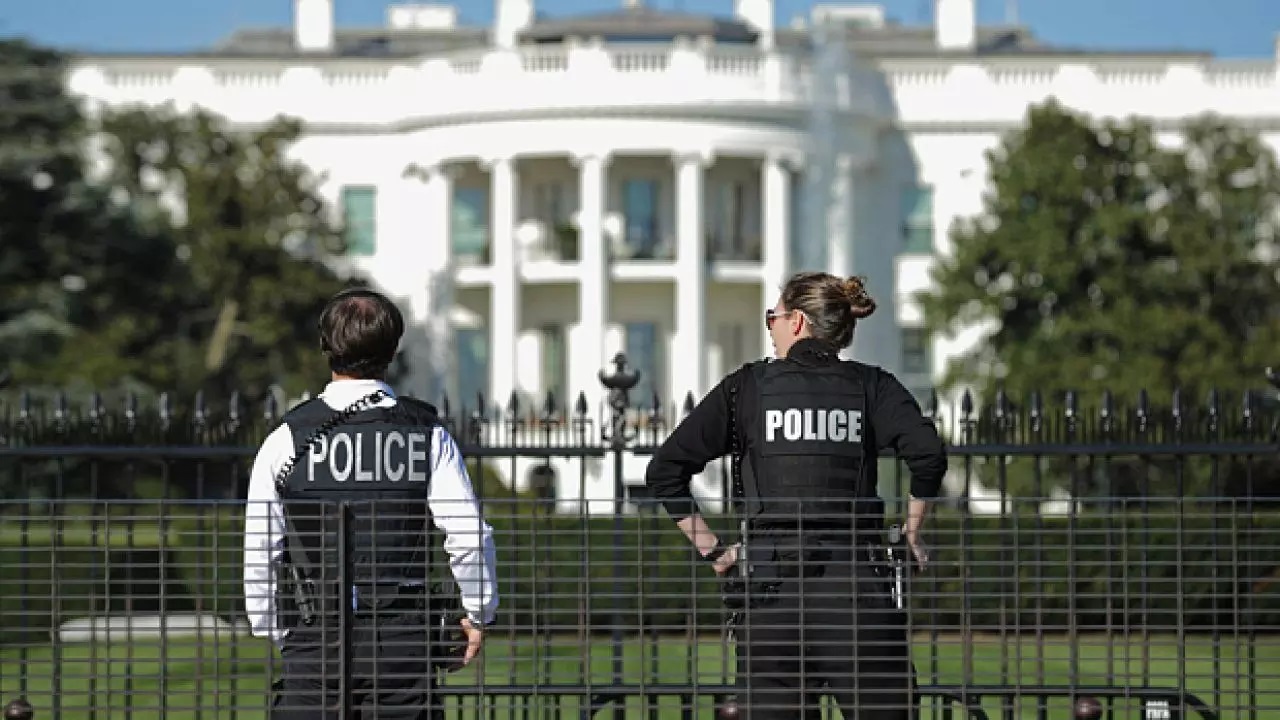
Law enforcement is currently responding to reports of a suspicious package near the White House.
The area has been secured, and specialized units are on-site to assess the situation.
Authorities are urging the public to avoid the vicinity until further notice.
The section between 15th and 17th streets is completely shut down.
The bomb squad is now examining a suspicious package discovered in a dumpster nearby.
The package was found about 500 meters from the White House. President Donald Trump is currently in residence.
This is coming a day after Trump imposed tariffs on several countries, including US allies.
-

 Politics8 hours ago
Politics8 hours agoTinubu Gives Fani Kayode, Others New Appointments (See Full List)
-

 News8 hours ago
News8 hours agoDANGER! Ex-Soldier Abubakar Affan Vows to Kill VeryDarkMan ‘Like Deborah Samuel’
-
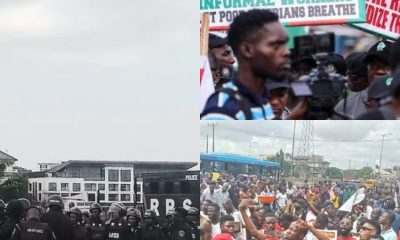
 News24 hours ago
News24 hours agoSecurity Alert: Police alert officers ahead of nationwide protest over living costs, free speech
-

 News12 hours ago
News12 hours agoWhy NYSC maybe extended by FG- Minister
-

 News22 hours ago
News22 hours agoVOA Halts Operations In Nigeria, Others Over President Trump
-

 News11 hours ago
News11 hours agoIbas moves to rehabilitate damaged Rivers LG secretariats
-
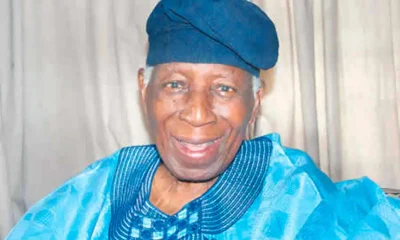
 News8 hours ago
News8 hours agoJust in: Ex-Oyo governor, Olunloyo is dead
-

 Economy12 hours ago
Economy12 hours agoCBN allocates $197.71m into FX market to support naira






